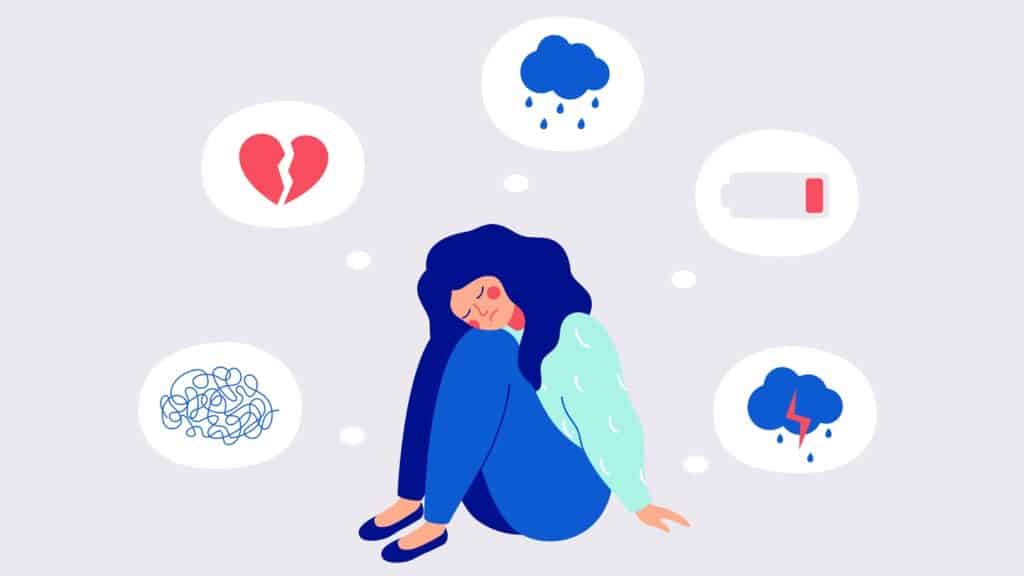Behavioral Health | The Root Cause Of Anxiety

Anxiety is a common emotional experience affecting millions of people worldwide. It is a slight to strong sense of discomfort that can include worry or fear and range from occasional to persistent. Anxiety can interfere with daily activities and impact one’s quality of life. It is crucial to understand its root causes to manage and overcome anxiety effectively. This article will explore the various biological, environmental, cognitive, and substance-related factors that contribute to the development of anxiety and provide a foundation for further understanding and treatment. By gaining insight into the underlying causes of anxiety, individuals can take control of their emotions and empower themselves to lead more fulfilling lives.
Definition Of Anxiety
Anxiety is a typical and frequently positive feeling. But when someone constantly feels out of proportion anxiety levels, it can become a disabling condition. Anxiety disorders are the most common mental illnesses The condition affects 40 million adults in the United States each year or 18.1% of the population. Understanding the root causes of anxiety is crucial for developing effective strategies for prevention and treatment.
Anxiety is characterized as a state of anxiety, trepidation, or disquiet resulting from an unclear situation. This normal emotion can be experienced by anyone and is often a stress response. However, it may indicate an anxiety disorder when anxiety becomes chronic and interferes with daily activities.
The significance of comprehending the underlying causes of anxiety cannot be overstated. Individuals can take control of their emotions by identifying the underlying factors that contribute to stress and empowering themselves to lead a more fulfilling life. Moreover, gaining insight into the causes of anxiety can also help healthcare professionals develop more effective treatment plans and improve outcomes for those who suffer from this debilitating condition.
Biological Causes Of Anxiety
Biological factors play a significant role in the development of anxiety disorders.
- Family history and genetics might raise a person’s risk of developing anxiety by up to 30-40%. This is because specific genes that regulate mood and behavior can be passed down from generation to generation.
- Chemical imbalances in the brain also contribute to the development of anxiety. Anxiety disorders have been linked to neurotransmitter imbalances, such as those that control mood, such serotonin and norepinephrine and behavior. When the levels of these neurotransmitters are disrupted, it can result in feelings of worry, nervousness, and fear.
- Chronic medical conditions can also contribute to the development of anxiety. Certain medical conditions, such as heart disease, thyroid disorders, and respiratory problems, can cause physical symptoms that can trigger feelings of anxiety. Chronic pain, sleep disturbances, and other physical symptoms can cause stress.
Environmental Causes Of Anxiety
Environmental factors, including traumatic life events, chronic stress, and substance abuse, can also play a significant role in the development of anxiety.
- Traumatic life events, such as losing a loved one, physical or emotional abuse, and natural disasters, can cause intense anxiety and fear. These events can leave lasting psychological scars that can trigger stress in the future.
- Chronic stress, whether from work, relationships, or other sources, can also contribute to the development of anxiety. When a person is under constant pressure, it can cause the release of stress hormones, such as cortisol, which can interfere with the regulation of mood and behavior, leading to feelings of worry, nervousness, and fear.
- Substance abuse, including alcohol, drugs, and caffeine, can also contribute to the development of anxiety. Substance abuse can cause chemical imbalances in the brain and trigger anxiety symptoms. Additionally, withdrawal from substances can also cause intense feelings of anxiety.
Psychological Causes Of Anxiety
Psychological factors, such as perfectionism, unrealistic expectations, negative self-talk, chronic worry, and rumination, can also contribute to the development of anxiety.
- Perfectionism and unrealistic expectations can cause individuals to set overly high standards for themselves and others, leading to disappointment and frustration. This can trigger anxiety as individuals focus excessively on avoiding failure and making mistakes.
- Negative self-talk and thoughts, including excessive self-criticism and negative self-image, can contribute to the development of anxiety by perpetuating feelings of low self-worth and inadequacy. These negative thoughts can lead to a vicious cycle of anxiety, fueling further negative thoughts and self-doubt.
- Chronic worry and rumination, the persistent and excessive focus on negative thoughts and scenarios, can also contribute to the development of anxiety. This type of repetitive thinking can cause individuals to become overly focused on potential threats and dangers, leading to feelings of worry and fear.
Substance Use Causes Of Anxiety
Substance use can also play a role in developing and exacerbating anxiety symptoms.
- Alcohol and drug abuse can cause chemical imbalances in the brain and trigger anxiety symptoms. Additionally, withdrawal from these substances can also cause intense feelings of anxiety.
- Medication side effects can also contribute to the development of anxiety. Some medications, particularly those used to treat medical problems such as excessive blood pressure, heart disease, and depression, can cause anxiety as a side effect.
- Caffeine and sugar intake can also contribute to the development of anxiety. Having a lot of sugar and/or caffeine can cause physical symptoms, such as jitters, rapid heart rate, and restlessness, which can trigger anxiety symptoms.
Interplay Between Different Causes Of Anxiety
The development of anxiety results from a complex interplay between biological, environmental, and psychological factors. It is common for individuals to experience a combination of these factors, making it difficult to pinpoint a single cause for their anxiety.
For example, a person having a genetic propensity to anxiety may experience increased anxiety symptoms due to chronic stress and negative self-talk. Similarly, a person who has experienced traumatic life events may develop anxiety symptoms exacerbated by chemical imbalances in the brain and perfectionistic tendencies.
The complex nature of anxiety and its causes demonstrates the necessity for prevention and therapy to take a holistic approach. By understanding the interplay between different causes of stress, healthcare professionals can develop tailored treatment plans that address each individual’s unique needs and experiences. Additionally, individuals can take an active role in their treatment by recognizing and addressing the different factors contributing to their anxiety.
Treatment For Anxiety
Treatment for anxiety is an essential aspect of managing this common mental health condition. Reducing symptoms is the treatment’s aim. and improves quality of life. Several approaches to treating anxiety include therapy, medication, and lifestyle changes.
Therapy:
- Cognitive-behavioral therapy (CBT) is a standard therapy that helps people recognize and alter harmful mental patterns and behaviors contributing to anxiety.
- Exposure treatment includes exposing the patient in a controlled manner to situations or stimuli that trigger their anxiety in a controlled environment.
- Mindfulness-based stress reduction with acceptance and commitment therapy (ACT) (MBSR) are two examples of mindfulness-based therapies that can be beneficial. individuals manage anxiety by improving their ability to tolerate and accept their symptoms.
Medication:
- Selective serotonin reuptake inhibitors are antidepressants (SSRIs) and serotonin-norepinephrine reuptake inhibitors (SNRIs), which are commonly used to treat anxiety.
- Benzodiazepines are fast-acting medications that can help reduce symptoms quickly, but they are typically used for short-term use due to their risk of dependence and withdrawal.
Lifestyle changes:
- Regular exercises, such as yoga and tai chi, can help reduce stress and improve mood.
- A healthy diet, including reducing caffeine and sugar intake, can help manage anxiety symptoms.
- Good sleep habits, such as maintaining a consistent sleep schedule, can help improve sleep quality and reduce anxiety symptoms.
Treatment for anxiety is an essential aspect of managing this common mental health condition. Reducing symptoms is the treatment’s aim and improve quality of life. Several approaches to treating anxiety include therapy, medication, and lifestyle changes.
Can Anxiety Be Treated?
Yes, anxiety can be treated. Treatment options for anxiety include therapy, medication, lifestyle changes, and self-care practices. The most effective treatment plan for fear will depend on the individual’s unique needs and experiences.
What Is The Role Of Medication In Treating Anxiety?
Medication can be a helpful complement to therapy in the treatment of anxiety. Antidepressants and anti-anxiety medication can help manage anxiety’s physical symptoms, making it easier for individuals to engage in treatment and make lifestyle changes.
How Important Is A Healthy Lifestyle In Managing Anxiety?
A healthy lifestyle is an essential component of managing anxiety. Engaging in regular exercise, maintaining a balanced diet, getting enough sleep, and managing stress through relaxation techniques can all help to reduce anxiety symptoms.
Can Anxiety Be A Symptom Of A More Serious Condition?
Anxiety can occasionally be a sign of a more serious underlying condition, such as heart disease or depression. It is critical to get medical help if anxiety affects daily life and to rule out any underlying medical conditions.
How Can I Help A Loved One Who Is Suffering Anxious?
Helping a loved one with anxiety can involve:
- Providing support and encouragement.
- Educating yourself about stress and its treatments.
- Encouraging the individual to seek professional help when necessary.
It is also essential to avoid pushing the individual to “just get over it” and to be understanding and patient.
In conclusion, anxiety is a complex mental health condition that biological, environmental, and psychological factors can cause. Understanding the root causes of anxiety is the first step in managing symptoms and improving quality of life. While there is no one-size-fits-all solution, treatment for anxiety can include therapy, medication, and lifestyle changes. The best approach will depend on the individual’s specific needs and situation. It is important to remember that seeking help and support is critical to managing anxiety. With the right combination of treatment and self-care, individuals with anxiety can find relief and achieve their goals. Whether it is through therapy, medication, or lifestyle changes, taking control of anxiety is possible, and the journey to recovery can be rewarding.
Things To Do In Santa Ana California
Santa Ana California News

